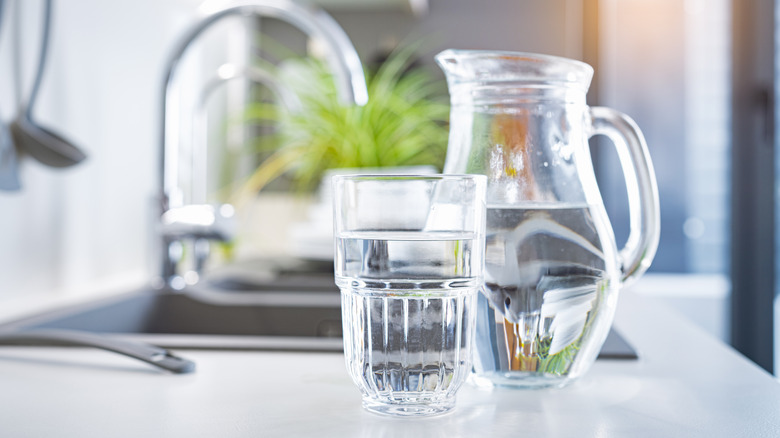The Reason It's Sometimes Worth Cooking With Pricey Bottled Mineral Water
Water is a rather straightforward ingredient in any recipe — most people don't even blink when they fill up a measurement cup with tap water to add to the pot. But you'd be surprised to learn that water quality can actually influence how good the end result of your recipe is, and tap water quality is right at the bottom of this scale. What's higher up the scale, you ask? Mineral water!
While bottled mineral water (also known as spring water) might seem rather extravagant and even unnecessary, it can genuinely enhance the flavor and quality of certain dishes. Some chefs swear by using mineral instead of tap water in water-forward recipes, such as soups and stews. Supposedly, it adds subtle mineral notes to the liquid base, elevating the overall taste. Mineral water is also the preferred choice for pastry chefs and bakers. Tap water can vary in hardness or softness, which can affect dough texture and fermentation. As such, bottled mineral water, with its relatively consistent mineral composition, is preferred since it often produces better results.
However, remember that you don't need mineral water for every recipe. In most cases, tap water works just fine. Save your money for better quality core ingredients, unless the recipe truly benefits from the unique mineral qualities of bottled water like in the cases above!
What does mineral water taste like, exactly?
Much like how Old World wine has different flavors than those made in the New World, thanks to differences in soil and climate (a concept known as "terroir"), mineral water also follows this principle. The type of bedrock, whether it's granite, volcanic rock, or limestone, greatly influences the trace minerals in the water, resulting in distinct flavors. For instance, water taken from volcanic areas is smooth and crisp with a "slightly sweet" aftertaste, thanks to its natural alkalinity. On the other hand, water from limestone-rich areas is also sweet but has a completely different mix of minerals, making it useful for many unique purposes, such as bourbon production.
In the end, the simple truth is this: Mineral water tastes like, well, water. However, if you really pay close attention, you'll notice some subtle notes that enhance its basic crispness. The difference from regular tap water might not be immediately obvious when you're sipping mineral water by itself. But, when you use it in recipes with a liquid base, that's where you'll truly savor these nuances. Try experimenting with various bottled mineral water brands and maybe even try switching back and forth between tap water and mineral water while you're cooking, then tasting to see the difference. Over time, you're likely to develop a deeper appreciation for the delicate flavors that mineral water can bring to your dishes!

